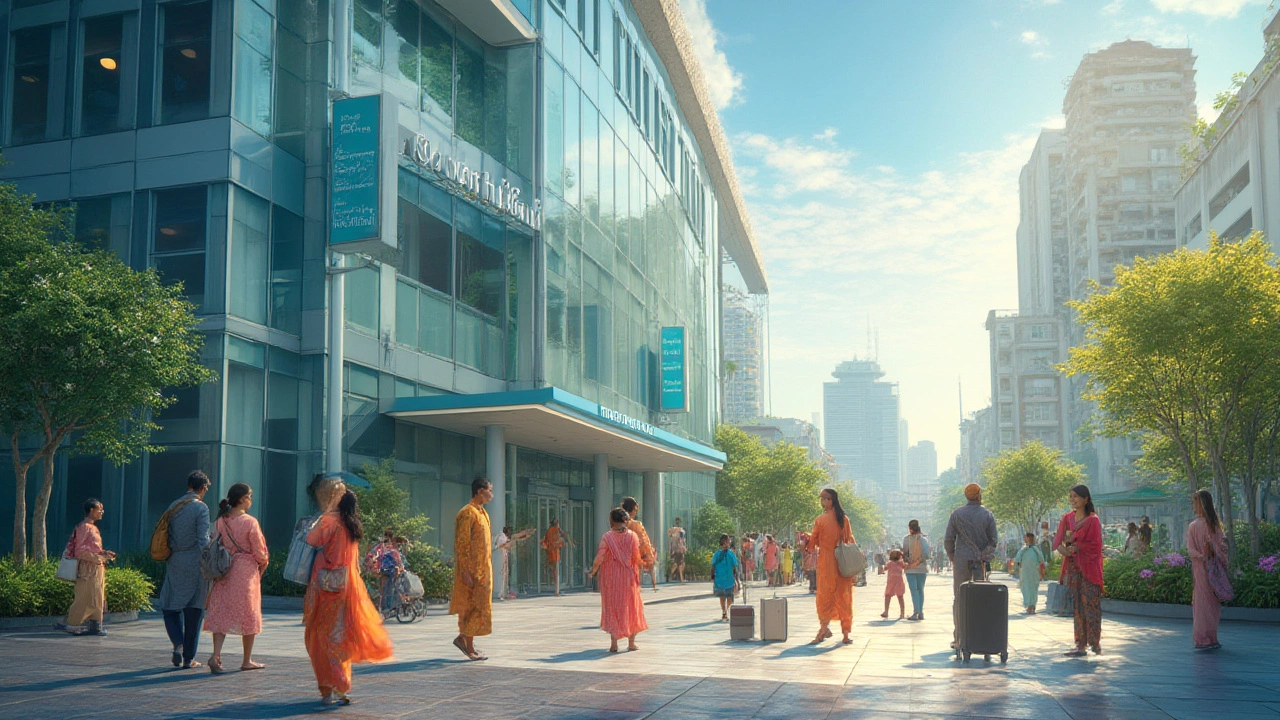Why Thailand Is the #1 Medical Tourism Destination in 2025
 Jul, 29 2025
Jul, 29 2025
Ever think about flying thousands of miles just for a doctor’s appointment? Millions of people are doing it, not because they love airports, but because their health—and their wallets—thank them for it. The worldwide rush for the best medical care at bargain prices has spawned a whole industry: medical tourism. And while plenty of countries stepped up to the plate, Thailand has smoked the competition. It’s not just about cheaper surgeries either; the whole package is why folks keep coming back. Fancy recovering from knee surgery while sipping coconut water on a tropical beach?
What Makes Thailand the Leader in Medical Tourism?
Thailand isn’t just a random name that shows up in medical tourism lists. Year after year, it leads for one simple reason: trust. Thai hospitals attract over 2 million international patients every year, from Japan to the Middle East to the US and the UK. CNBC reported that Bangkok’s Bumrungrad International Hospital alone serves more than 500,000 patients from outside Thailand each year. If you compare that to big hospitals back home, those numbers are wild.
The country’s private hospitals are a whole different beast. They offer five-star service you’d expect in a luxury hotel, not a hospital. Nurses speak fluent English, receptionists greet you with a bow, and most clinics are legit gorgeous—marble floors, restaurants, even spas on site. They cater to people who want more than medicine; they want comfort, food that doesn’t taste like cardboard, and WiFi fast enough to binge-watch Netflix while recovering.
But trust doesn’t come from pretty lobbies. Most leading hospitals in Thailand are internationally accredited. Bumrungrad International Hospital was the first hospital in Asia to get JCI accreditation, now widely respected as the gold standard. Clinicians there often have degrees from the US, UK, Australia, and Japan. Plus, some specialize so intensely—like entire wings dedicated only to cosmetic surgery or heart care—that you can find experts who’ve performed hundreds, even thousands, of procedures just like the one you need.
Cost Savings and Quality: Why People Choose Thailand
Let’s talk dollars and cents, because this is where Thailand really shines. If you’re American and your insurance denies the surgery you need, or you're British and sick of waiting lists, Thailand offers a financial escape. An average heart bypass in the US can cost upwards of $120,000. In Thailand, that same surgery from a JCI-accredited hospital runs about $15,000—sometimes less. That’s not a typo. Even simple care proves cost effective: Dental implants? $2,000 in the US, but $700 in Thailand, including hospital and surgeon fees. Skin treatments, cancer care, IVF, hip replacements—if you can name it, you can probably find it for a third or a quarter of the price, without sacrificing safety.
That affordability lets people treat themselves to ‘extras’—like private rooms, gourmet food menus, hydrotherapy, and even city tours for family members waiting in the lobby. Thailand’s healthcare system also bundles expensive procedures with physical therapy and follow-up appointments, all included for one flat price. Hidden fees aren’t a thing here; prices are transparent and upfront. Got a travel companion? Many hospitals let them bunk with you, free of charge.
Quality isn’t sacrificed. Sure, there are budget clinics, but the leading hospitals look and feel every bit as cutting-edge as any in Europe or the US. Thailand’s best surgeons return from Harvard, Cambridge, or Sydney, bringing back the latest techniques in everything from hair transplants to robotic surgery. Medical technology—robotic arms, latest MRI machines, endoscopic cameras—is often newer than what you’ll find in big city hospitals back home. Plus, culturally, Thais emphasize hospitality. You really do feel cared for beyond the basics of clinical medicine.

Types of Treatments and Popular Procedures for Medical Tourists
Cosmetic work made Thailand famous—think facelifts, rhinoplasty, liposuction—but that’s just the tip of the iceberg. In 2025, top procedures for medical tourists include orthopedic surgeries (like knee or hip replacements), eye surgeries (especially LASIK and cataract removal), fertility treatments like IVF, complex dental work, cardiac care (bypass and stent placement), oncology, anti-aging therapies, gender reassignment surgery, and specialty screenings. Thai hospitals often package these treatments with transfers, translators, and even sightseeing options, making the process seamless.
You’ll find entire hospital wings devoted to specialties. For example, Samitivej Hospital in Bangkok is famous for its pediatric care and women’s health center, while Bangkok Hospital focuses on neurology and advanced neurosurgery. Each facility cultivates teams who specialize, not just generalists, so they build deep experience over time. Thailand also attracts patients for wellness and integrative treatments—yoga therapy, Thai massage for rehabilitation, herbal healing, and detox plans. It’s popular to combine a procedure with wellness recovery, so your trip becomes a blend of treatment and true vacation.
Medical tourists often cite short wait times. In many cases, you can fly in, get evaluated, and undergo surgery all within a week—something that simply isn’t possible with the long waiting periods in the UK, Canada, or Australia. And if an emergency arises, most hospitals guarantee 24/7 specialist availability. Quick, efficient, and centered around the patient's convenience.
Top Hospitals and Cities: Where to Go in Thailand for Treatment
Most visitors head straight for Bangkok, simply because it houses world-renowned medical centers like Bumrungrad International Hospital, Samitivej Sukhumvit, and Bangkok Hospital. These are modern skyscrapers packed with every specialty under one roof, international patient services, interpreter desks, and limo transfers from the airport. Chiang Mai, Phuket, and Pattaya also draw crowds, especially for recovery by the beach (Phuket International Hospital pairs tropical islands with recovery time—who says healing has to be boring?).
Bumrungrad is still the gold standard. It boasts over 1,200 physicians, more than 200 interpreters for every major language, one-stop in-house diagnostics, plus VIP suites that look more like luxury condos than hospital rooms. Samitivej Hospital’s international program has won global awards for pediatric safety and women’s care, which is why families flock there. Bangkok Hospital, the flagship of Thailand’s largest private hospital group, is at the forefront of minimally invasive surgery, stroke care, and spine treatments.
In Phuket, Bangkok Hospital Phuket is a staple for dental work and cosmetic surgery, with seamless airport-to-clinic transfer services (and yeah, killer ocean views). Chiang Mai Ram Hospital offers advanced fertility treatments and post-surgery rehab in a quieter, more relaxed city environment. Nearly all these centers have dedicated teams for international visitors—so someone is always available for language translation, insurance verification, and post-care support.

Tips for Planning a Safe Medical Trip to Thailand
If you’re considering Thailand for medical tourism, plan smart and don’t skimp on research. First off, always check that the hospital is accredited—look for Joint Commission International (JCI) certification or local equivalents. Contact the hospital’s international patient center to get a personalized treatment estimate; they’ll often coordinate video consultations with doctors before you travel. Bring your full medical history, scans, and prescriptions in English.
Double-check visa rules. While most nationalities get a visa on arrival, medical tourists from some countries may qualify for special medical visas, allowing longer stays for complex procedures or extended recovery. Make sure you have comprehensive health travel insurance; plenty of travel insurance won’t cover elective procedures, so check the fine print or find a provider that specializes in this.
Arrange accommodations close to the hospital, since Bangkok’s traffic is legendary (not in a good way). Many international hospitals run their own serviced apartments, often on the same campus, which saves you time and stress. If you’re worried about the language barrier, know that major hospitals staff proficient English speakers; if you’re heading to smaller cities, book a private translator just in case.
Finally, build in time to relax post-op. Thai rules mean you can undergo most procedures and start recovery right away—on-site spas are not an exaggeration, they really exist (and the massages are real deal, not just a hotel perk). Try Thai food only after your doctor gives the thumbs up—some dishes are notoriously spicy and rich. And, always have a friend or family member travel with you if it's a big operation; they’ll keep you company and help if you need anything while you’re recovering.